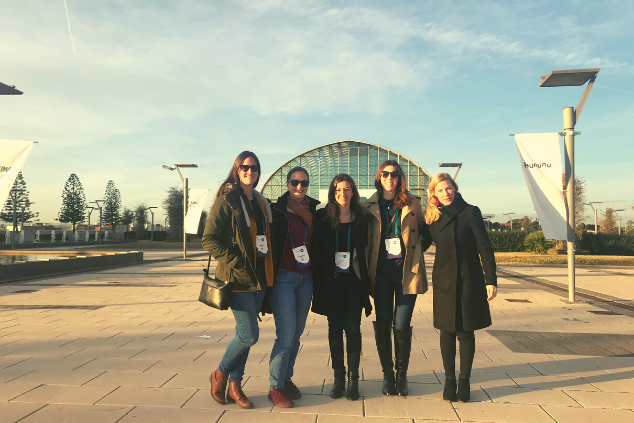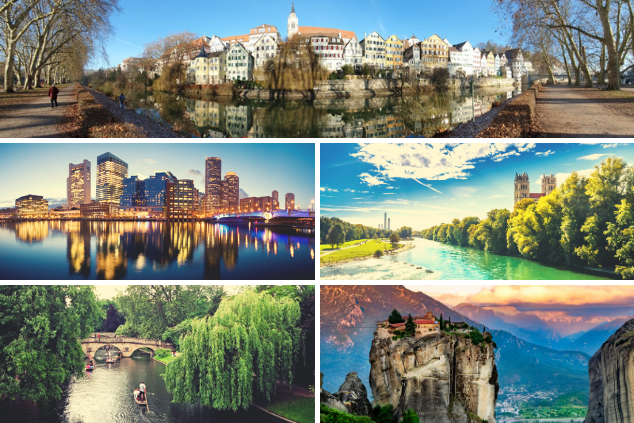In the series “Job Profiles”, we talk to various members of the InterNations team about their position and the work that they do.
For the latest instalment, we’ve interviewed Crissy, a US American expat who works in our Content & Communications Department.

How long have you been working at InterNations? And what is your current job all about?
I’ve been at InterNations for about a year and a half — it was in February 2019 that I started in the Content & Communications Department. I work in the Product Content Team, where I am the resident Marketing & Product Copywriter.
My job consists of two main parts: firstly, coming up with engaging marketing copy in order to sell the InterNations brand and what we offer to our members around the world; secondly, writing so-called microcopy for our platform, helpful short texts that instruct the users what to do on our website and our app, from the labels on a form they need to fill in to a call to action on a clickable button.
Can you tell me more about what you typically work on?
In the past 18 months, I have been working on numerous small tasks and several big projects, frequently supporting other teams and departments throughout the organization. Writing microcopy for the InterNations website and app means that I often work closely with the Product Development Team. One of the first projects I ever contributed to was the overhaul of our registration flow. Product Development was making significant changes for all those who want to sign up as new InterNations members. Not only did they adjust the process itself, but they also wanted to revise the wording. But I support many other teams as well.
For example, I regularly provide the Online Marketing Team with copy for our Facebook ads and our SEO landing pages. At the moment, I also have a lot of marketing cooperations on my plate, where I create ads and advertorials for magazines, such as Deutsch Perfekt or Discover India, to invite their readers to join InterNations. And we send our Basic Members themed campaign emails on special occasions — for example, the InterNations anniversary — to offer them a free trial that lets them get a taste of our premium Albatross Membership.
This year, I have also been very involved in the InterNations Tours project, working closely with the Community Engagement Team. The idea is to make it possible for our members to travel and explore the world together. We want to offer them a brand-new experience where they can enjoy an unforgettable vacation with other expats and global minds. I’ve created PDF brochures, landing pages, and other marketing materials to advertise these tours. However, the project was thwarted by the COVID-19 crisis. The timing was just really unfortunate. But I still think it’s a fantastic idea, and we have found several great tour operators to work with. I hope we can soon pick up things where we left them — we’ve learned so much about organizing and promoting the tours that we’ll be ready to go once planning a trip is safer and more predictable again.
Speaking of COVID-19: Some of my smaller tasks often need to be done at very short notice, and the coronavirus-related crisis communication is a good example of this. When things went really crazy during the rapid spread of the pandemic and we had to cancel all our in-person events in the spring, I was involved in the communication process. In such a situation, it is very important to find the right words and get the tone of voice right!

And how did you come to apply for this position?
I found out about the position at InterNations through job ads on XING and LinkedIn. At the time, I was a freelancer, offering my services as a translator and copywriter to local businesses, small and medium enterprises, other freelancers, and a couple of agencies. However, I’d come to a point where I was interested in working for a company again if I could find one that was a really good fit. So, I’m very happy that I stumbled upon these ads, because I really enjoy working at InterNations!
What did you do before joining the InterNations Team? Have you always worked as a freelancer?
I graduated from Tufts University with a degree in international relations and German studies. Early in my career, I worked as an international program manager for different organizations, such as EF Education First in Boston and Lucerne, Switzerland, and the American Council on Germany in NYC. Marketing-related tasks were part of these jobs — when you coordinate such a program, you do all kinds of things, including marketing and sales. That’s how I realized that I was especially interested in the marketing and communications aspects, and I was planning to shift my professional focus at some point. About ten years ago, when I had my first child and needed to think about what my career would look like going forward, I decided to make this shift.
At the time, I’d just moved with my husband to Switzerland, and I worked on a short-term project at the Lausanne Chamber of Commerce. I was part of a new initiative there aimed at international companies in the region, for which I created a lot of English-language marketing materials. This inspired me to try something similar on my own. I ended up continuing to work for the Chamber of Commerce on a freelance basis and started building my own client base as well.
As the mother of a very small child, I really appreciated the flexibility and freedom of working from home and setting my own hours. Then my daughter was born three years later, and it certainly didn’t get any easier to balance life and work with two little ones. However, when my kids were a bit older, I found myself missing a more structured corporate environment, especially being part of a team.

You just talked about starting your freelancing business back in Switzerland. Was this the first time you’d lived abroad?
No, actually, I sometimes feel as if I have been going back and forth across the Atlantic my entire life.
My parents are Greek immigrants who came to the US in the 1970s, and I was born in Boston. But when I was eight years old, my dad decided to work at a Greek restaurant in Unna, a German town in the Rhine-Ruhr-Area, for a few years. It was owned by one of my uncles, and my parents seized the opportunity because they wanted my siblings and me to have this experience of living abroad. This was my first time as an expat; we stayed in Germany for six years. That’s also why I decided to study German later on.
In my college years, the Atlantic was pulling me back over again, so to speak, and I spent an academic year abroad at the University of Tübingen, where I also met my future husband. At first, he joined me in the US for a while, but then he landed a job in Munich, and back we went. Since 2004, I have been dividing my time between Germany, the UK (where I got a master’s degree in international relations from the University of Cambridge), and Switzerland, with a brief stint in NYC in between.
Of course, I have close ties to Greece too. Both of my parents come from large families, so I have lots of Greek relatives. While we were living in Unna, it was very easy for us to go to Greece on vacation and spend time with our extended family. They are from the middle of the mainland, from Trikala, a town in Thessaly. You might not have heard of it, but you probably know the famous Meteora monasteries, which are pretty close.
I still love going to Greece, but as an expat whose parents and siblings live in the US, I find it a lot harder to go there as much as I would like. But I hope I can spend more time in Greece with my own children in the future.
So, as a Greek-American expat living in Germany, where would you say that “home” is?
This is a really tough question, and I think I could fill many pages with the answer — it has so many layers. I feel really settled in the Munich area, where I have lived and worked for the past six years. My husband is German, my kids go to school here, and I have made friends here, so in a sense, home is where I am right now. But I still call Boston home, and Greece will always have a special place in my heart. I think, like so many expats, I have multiple homes.

Was there ever a time when expat life was hard for you, despite all your international experience?
My most challenging experience as an expat was probably the time when I used to live in the French-speaking part of Switzerland, right between Geneva and Lausanne. While I’m fluent in English, Greek, and German, I didn’t really speak the local language there. I’d taken some French classes in high school and college, so I didn’t have to start from scratch, but the language barrier was always there. Depending on the context, I was sometimes unable to understand what was going on around me, which I found extremely frustrating. It’s so much harder to adjust to life abroad and find new friends if you can’t fully communicate. When I write copy for InterNations, I often try to mentally transport myself back to this time and to remember the challenges I was facing, the same challenges that so many of our members face every day.
Last question: What you do like most about your work at InterNations?
No matter what I write, I always want the audience to take a specific action. That’s what all my tasks have in common, and that’s what I like about my job. Each task or project boils down to a series of small problems I have to solve; it’s a very pragmatic approach, but I need to be really creative at the same time.
As a copywriter, I always need to keep clear and specific goals in mind — for instance, getting the recipient of a marketing email to actually open it — and I can follow certain rules and formulas to achieve these goals. For example, according to the AIDA model, you need to catch someone’s attention first, arouse their interest in the benefits your brand has to offer, create a desire for your product, and then get them to take action — for example, by registering as a new InterNations member. But within all these frameworks, you have a lot of freedom, and the tasks are never the same. Each ad has a slightly different context, its audience might be slightly different, etc. Even if I keep following the same rules and structures, I consistently keep creating something new.
And I particularly enjoy collaborating so closely with so many different people, teams, and departments, from Salim, our Corporate Graphic Designer, to our colleagues from the Product Development Team. Even now that most of us are working remotely, I still feel like I’m part of a bigger collaborative effort.
Image credit: InterNations / iStockphoto / private (Crissy Müller)